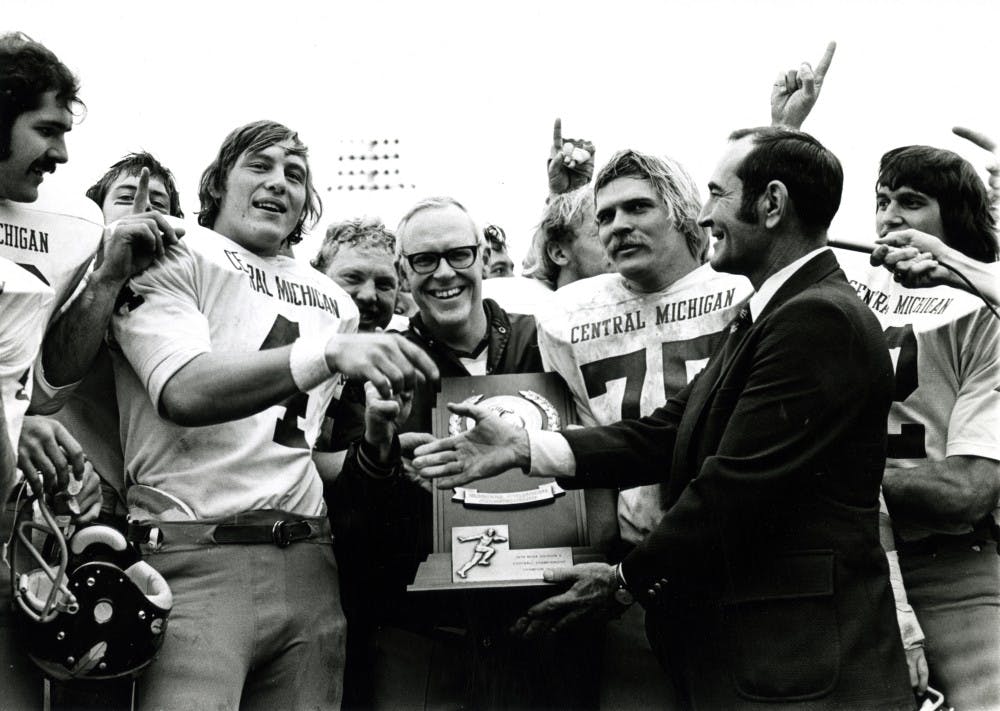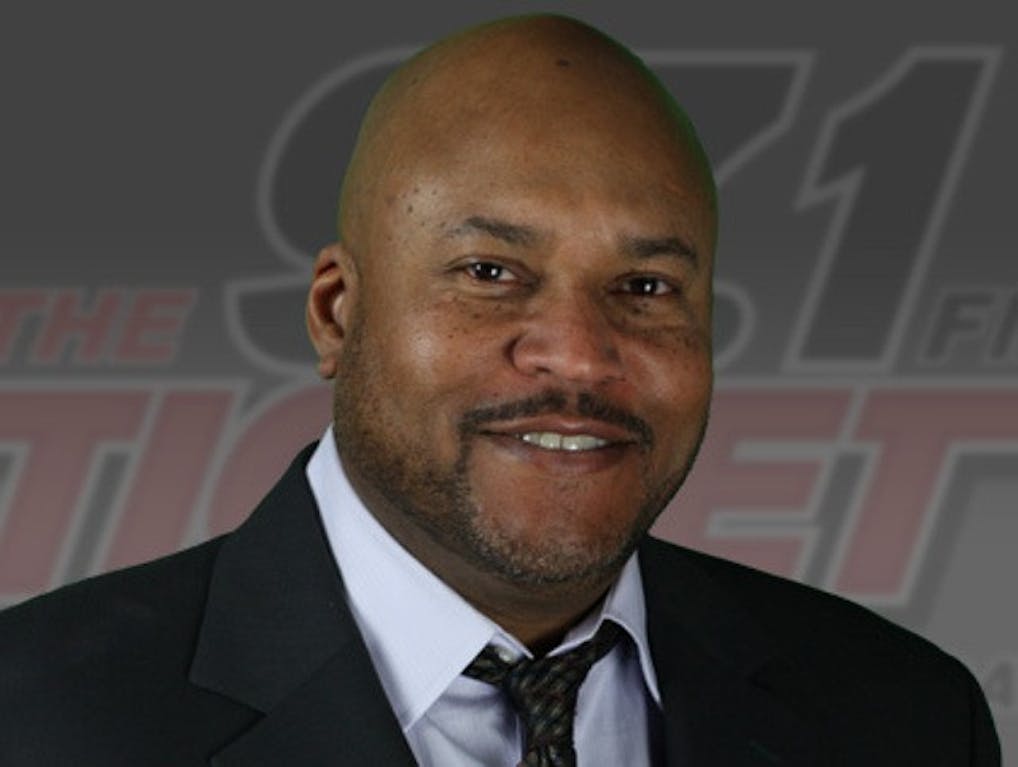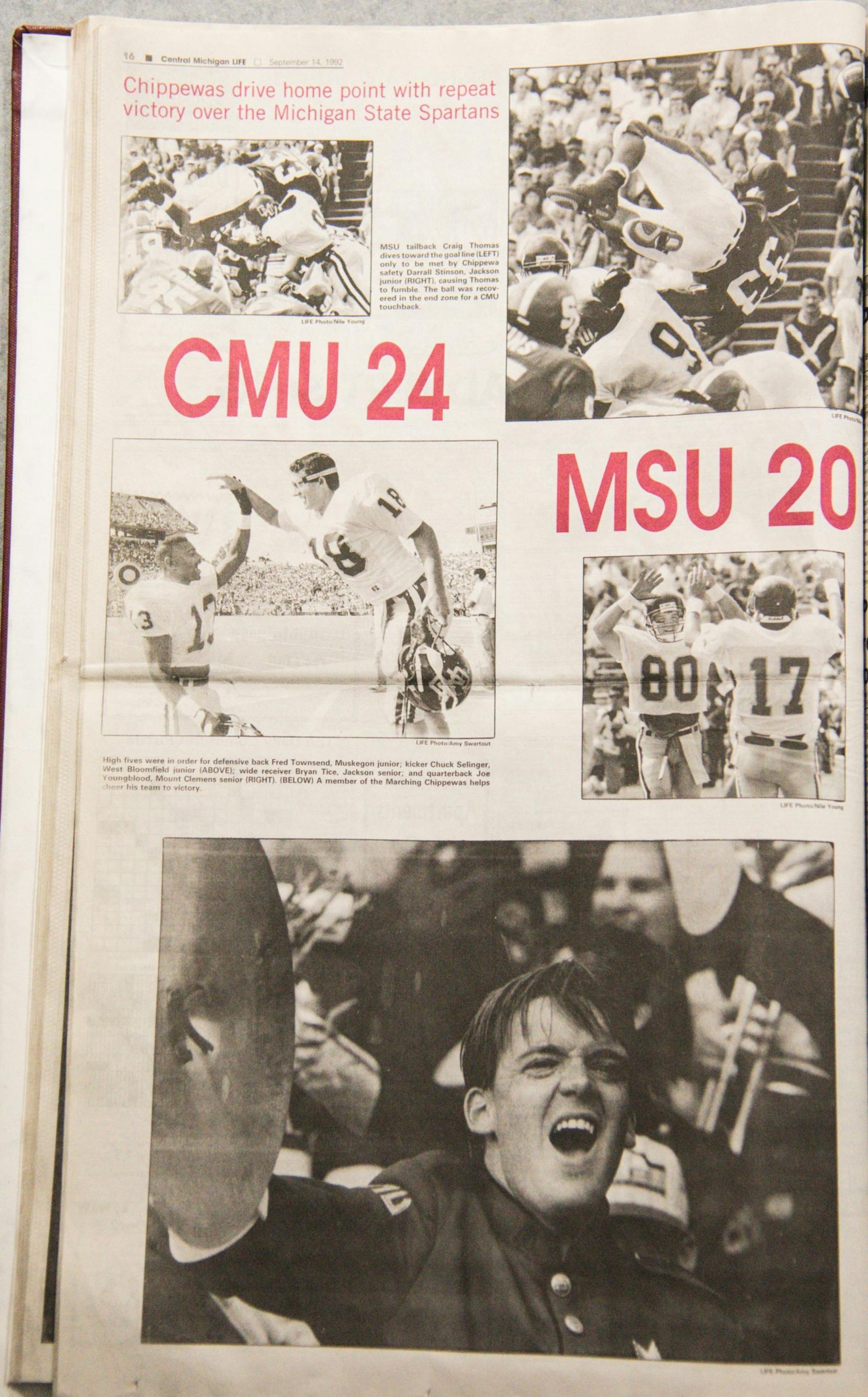The Sporting LIFE: Central Michigan Life's best sports stories

The Central Michigan Football Team accepts the trophy for winning the 1974 NCAA Division B Championship.
A court case, a last-second win, an appearance in the NCAA Sweet 16 and a national championship in 1974.
These are some of the biggest sports stories published in Central Michigan Life. While there are plenty of others, there remains one constant – Central Michigan Life’s sports department was there to give readers more than the score.
Changing the name
Central Michigan has used three official nicknames for its athletic teams since it began play in 1896. An unofficial nickname was the Normalities, then transitioned to the Dragons when students brought a dragon out during the 1923 homecoming game. Three years later, the nickname of Dragons was born.
However, it did not last long as a new nickname for the team came along just one year later.
In 1927, what was then Central State Life, the newspaper named used the name Bearcats in the Oct. 12 issue. The name stuck to the program.
Finally, in 1941, Central Michigan’s student council decided to change the name from Bearcats to Chippewas in celebration of pageantry and showmanship. To this day, the Chippewa nickname still brands the Central Michigan athletic teams.
Women joining the mix
In 1910, Central State Normal School prohibited the participation of females in athletic competitions.
Thirty years later, Central State Life reported that women were allowed to return to action and participate in sports once again. That said, the programs were incredibly different and heavily favored the men’s side.
Then, Title IX kicked in.
Perry Farrell served for CM Life from 1976-80. He was the newspaper's first African American sports editor.
Farrell said that the new law was an important story that he reported on during his time at Central Michigan.
“It was beneficial because it gave equal rights to women in sports,” Farrell said. “That was a crucial time during that period.”

Perry Farrell
Following his graduation from CMU, Farrell got his master's degree from the University of Michigan in 1981. He covered Wisconsin football and basketball for the Milwaukee Journal, while also working at the Ann Arbor News as a news reporter and the Louisville Courier-Journal as a copy editor and sports reporter.
That's when the Free Press called, and it's the newspaper Farrell called home for the next 30 years, all starting in 1988.
Farrell began covering Michigan State football and basketball, but he expanded his range to cover the Detroit Lions, Detroit Pistons, Detroit Tigers and high school sports.
He was the Free Press journalist that covered the Pistons' run to the NBA championship in 2004. He was assigned to cover high school recruiting in 2017 before retiring in January 2019.
When the new law requiring schools to equally represent women’s and men’s sports, the university had a decision to make. On Dec. 8, 1994, the university decided to cut the men’s soccer program to comply with Title IX.
Letters to the editor were sent to Central Michigan Life expressing their anger in response to CMU’s decision to cut the program.
Dark side of CMU Sports
Spencer Lewis was accused of beating Demarcus Graham outside of a bar in downtown Mount Pleasant in 2004. Graham died from his injuries 19 days later, and Lewis’ charges were dismissed.
Then-teammates Jerry Seymour and James King were both on trial while Jimmy Donald, Michael L. Thomas, Demond J. Petty and James Cooper were all given sentences for their role in the murder as well. The case went along for another two years as part of an ongoing battle to determine who killed the Flint native Graham.
The case, which had perjury and the judge of the case blocking the evidence, was arduous and difficult for everyone involved.
Matt Schoch worked at CM Life from 2001-04 where he worked the football and wrestling beats.
After CMU, Schoch started out as a sports reporter at the Times Herald in Port Huron and worked his way to becoming the assistant sports editor and eventually the Night City Editor.
While working at the Times Herald, Schoch worked at Clear Channel Radio as a producer and was the host of The Sports Attack on WPHM 1380-AM.
Schoch then moved to Springfield, Missouri, to serve as the prep sports coordinator at the Springfield News-Leader for nearly four years. He then made his way to the Virgin Islands to work as the sports editor of the Virgin Islands Daily News.
Upon returning to the United States, Schoch worked as a reporter covering the Southeastern Conference for Cox Media for a year. He then moved to Chicago, Illinois, as a freelancer for the Associated Press. He covered the Bulls, White Sox and Cubs while there.
Now, Schoch hosts his own podcast, Locked on Pistons, and covers Detroit sports for the Detroit News and the AP.
Schoch said he remembers the case because of scale of it and how the newspaper was reporting the investigation and trial.
"There were a lot of people unhappy with what we were reporting in the paper," Schoch said. "I remember that being one of the more memorable instances because we were reporting things that people didn't necessarily want out."
Terry Foster served on the CM Life staff from 1977-81 then went on to host his own radio show for 13 years at WXYT-FM The Ticket before retiring in 2017.
Before hosting his radio show, Foster was a full-fledged journalist.
Foster began his journalism career in 1981 with The Grand Rapids Press. One year later, he accepted a position at the Detroit Free Press to cover Macomb County high school sports.
Seven years later, in 1988, Foster made the switch to the top competitor of the Detroit Free Press – The Detroit News.

It was at that newspaper where he was the Detroit Pistons beat writer from the time of his hire until 1994. Foster covered the Bad Boys era, while also reporting on Michigan football, golf, tennis and auto racing.
Even when Foster got his radio gig, he wasn't limited. He broadcasted his radio show, Valenti & Foster, with Mike Valenti live from the 2006 Winter Olympics in Torino, Italy.
Foster said that Graham's murder was a main talking point for him on Valenti & Foster when it occurred, and he never would have expected it.
“It’s Central Michigan, nothing ever happens up there. Then this happened,” Foster said. “It was a big deal; I was just shocked.”
CM Life covered the trial in its entirety with stories from the athletes who were arrested, opinion pieces and coverage from each day of the trial.
In 2003, community members and students wrote to the newspaper signaling their displeasure of a student wearing a Native American headdress, war paint and a vest made of uncooked pasta, to a football game.
They said that the student was breaking the student code set by Central Michigan and called for a change to the team’s nickname. Some suggested “The Flying C” to be used as the new nickname for the athletic program to eliminate the portrayal of Native Americans.
Two years later, the NCAA issued guidelines for the use of Native American mascots, images and references associated with its member universities. Central Michigan was one of 18 that was examined by the NCAA and was allowed to continue using the “Chippewas” nicknames.
Central Michigan football players were caught selling drugs out of their dorm room in 2012 and all three players were kicked off the team by then-coach Dan Enos.
Former running back Austin White was on the run for 48 hours but eventually turned himself over to the police.
Aaron McMann, who served on the CM Life staff from 2009-13, said that the story may have been one of the most interesting that he had during his time at CM Life.
“I distinctly remember the front-page headline the next day in CM Life, ‘Austin White is wanted by police,’” McMann said. “That was a wild 48 hours, they got it on ESPN.”
McMann got his first gig out of school at The Flint Journal in 2014, emphasizing on high school sports and the OHL's Flint Firebirds.
Just over a year following his hire, McMann was transferred from high school sports in Flint to a statewide sports reporter. He covered the Detroit Pistons, Detroit Tigers and Michigan football for the eight newspapers owned by MLive Media Group.
McMann stepped up to the plate and showcased his skillset that dated back to his time at CM Life. He became the Detroit Pistons beat writer in August 2016, and he has since covered Michigan football for MLive as the full-time beat writer since August 2017.
Big wins and championships
Central Michigan’s football program made the jump from Division II to Division I in 1975, a year after the team won the Division II national championship under Roy Kramer with legendary coach Herb Deromedi as an assistant.
Foster said that the jump was first pronounced by quarterback Gary Hogeboom in 1976 against Bowling Green when he led the team to a win coming back from a three-touchdown deficit in Perry/Shorts Stadium.
“We knew that Central Michigan had arrived in Division I, at least in the Mid-American Conference,” Foster said. “He was a guy that was going to play in the NFL.”
The next program-changing win for Central Michigan came in 1991 and 1992 when the Chippewas knocked off Michigan State in consecutive seasons.
“The headline was ‘Twice as nice,’” Foster said. “That was huge, it was unexpected, but it happened.”
In 2003, Central Michigan’s men’s basketball team won the Mid-American Conference Tournament and advanced to the NCAA Tournament under coach Jay Smith.
In that appearance, the Chippewas knocked off No. 6 Creighton and moved to the second round and faced Duke. While Central Michigan fell out of the tournament, the win was big for the program.
CMU has not returned to the NCAA Tournament since that appearance.
Six years later, Central Michigan returned to the MAC Championship Game after an undefeated campaign against conference opponents. The Chippewas also defeated Michigan State a third time that season by kicking a field goal as the clock expired.
Anthony Fenech worked on the CM Life staff from 2008-11. Following his graduation, he went to work at the Detroit Free Press as a freelancer.
Fenech also had internships at the Las Vegas Sun and MLB.com, where he covered the Arizona Diamondbacks.
When he first started, Fenech covered high school, college and professional sports and worked his way to serving as the Free Press' Detroit Tigers beat writer, which he has done since 2011.
"I remember that was a really big game," Fenech said. "That Michigan State game was a really big deal."

McMann said that the vibe on campus around that team was unlike seasons prior.
“They had several talented guys,” McMann said. “Folks enjoyed going to football games, students were coming out in masses every week for home games. At that point, CMU was considered a top-25 program, and they were playing like it.”
After the 2009 season, the Central Michigan program hired Dan Enos as its coach following a successful era from Brian Kelly. Under Enos, the Chippewas were able to defeat two Power Five teams, both in the Big Ten – Iowa in 2012 and Purdue in 2014.
Enos then resigned and John Bonamego took over his alma mater in 2015.
In Bonamego’s second season, CMU was able to pick up a monumental win Oklahoma State as the Chippewas completed an improbable Hail Mary on a free play. It is still considered one of the biggest wins in CMU football history.
In the next school year, the Central Michigan women’s basketball team advanced to the Sweet 16 in the NCAA Tournament under legendary coach Sue Guevara.
Central Michigan Life followed the team to Spokane, Washington, and the sports reporters reported on the Chippewas in their quest to survive and advance in its first appearance in the Sweet 16.
CMU defeated LSU and Ohio State in the first two rounds of the tournament to advance that far after losing just one game in conference play and carrying a 30-4 overall record.
Legacy of CM Life sports
Schoch: "CM Life sports is kind of that plucky, mid-major type of group, but it's always good. We always have good sports journalists there. We've got good mentors, professors and advisers for the paper to where if there's enough talent in the room, they're going to make it an outstanding sports section."
Farrell: "Quality work, we're not homers, we ask coaches tough questions. We've won a lot of awards because we do it the right way."
McMann: "We've had a lot of talented people go through there. We, just as anyone in the state, bust our butts. That's what CM Life is known for, working hard, busting our butts and making a name for ourselves. In the last decade, we've done that. We've had a long legacy, not just the sports department but CM Life in general of producing great journalists."
Fenech: "We have a bit of a chip on our shoulder. We have to prove ourselves more because we do come from a smaller college. But I'd put us up against (anyone) any day because of that chip on our shoulder."





